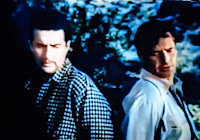This French film was a runaway hit in the 60s, possibly because it had the cachet of an artsy new wave movie, but was essentially a very accessible soap opera romance featuring attractive stars. (The insanely catchy theme song by Francis Lai, which became a radio hit, could be another reason.) I gave this a mini-review over twenty years ago, disappointed that I had seen an English dub, but I recently found a DVD of the film with the original French audio and English subtitles at my library, so I gave it another shot. The plot is simple: a young widow and young widower meet while dropping their children off at a boarding school. Anne (Anouk Amiée) is a script girl whose husband, a stuntman, was killed in a stunt accident; Jean-Louis (Jean-Louis Trintignant) is a race car driver whose wife killed herself when he was badly injured in a race track accident. They get to know each other over a period of a couple of weeks. As he races at Monte Carlo, she follows the press coverage and impulsively sends him a telegram expressing love. When the race is over, he impulsively drives all night to see her in Deauville. They begin to make love, but memories of her husband cause Anne to halt the proceedings. She decides they should end their relationship and takes a train back to Paris by herself. Jean-Louis has one more crazy romantic gesture left to get her to change her mind.
This came off to me as a glossy 60s version of a glossy 50s romantic melodrama. The main difference is that this film fragments the narrative in ways that may have been new and different in 1966. For example, the characters' tragic backstories are filled in piecemeal, like visual flashbacks with little verbal explanation given. The film alternates between black & white and color for no obvious purpose—some critics say that color changes reflect past versus present, or inside versus outside, but those patterns aren't followed. Apparently it just was a solution to a budget problem, but it seemed profound to viewers at the time (the same applies to Lindsay Anderson's IF a couple years later). Amiée and Trintignant are excellent in the lead roles—good-looking, charming, and able to overcome the vagueness of their character's backgrounds and personalities; even though almost every scene features one or both of them, you never feel like you know them. This is basically a two-actor show, but I liked Simone Paris as the boarding school mistress who subtly encourages the romance. The racing scenes were too numerous for my taste, but it is, for the most part, gorgeously photographed. A number of shots of the leads together look like they were taken from glossy TV ads, but probably this movie influenced the later ads. The finale is giddily romantic and satisfying, right out of a classic-era Hollywood romance. Original title: Un homme et une femme. [DVD]













